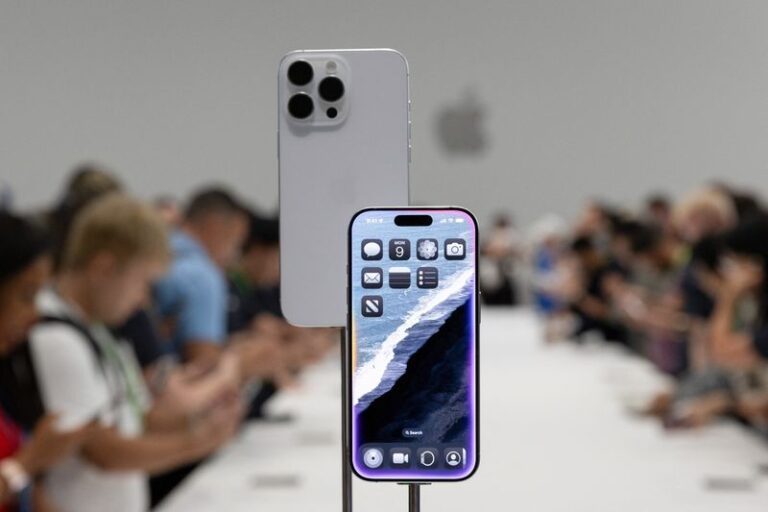By Max A. Cherney and Kenrick Cai
CUPERTINO, California (Reuters) – Apple unveiled its highly anticipated artificial intelligence-powered iPhone 16 on Monday and promised improvements to its Siri personal assistant as it rolls out new software that will begin testing next month.
“The next generation of iPhone was designed from the ground up for Apple Intelligence, and it marks the beginning of an exciting new era,” CEO Tim Cook said at the product launch.
Apple shares closed the day at $220.91, just hours before Huawei launched a tri-fold phone, underscoring the competitive challenge the iPhone maker faces. Apple has yet to announce an artificial intelligence partner in China to power the 16s.
Apple and tech companies around the world are racing to incorporate artificial intelligence into their products, and phones are expected to be among the main battlegrounds. The Cupertino, California-based company is also betting that the AI feature will prompt consumers to upgrade their devices amid slowing iPhone sales.
Apple Intelligence, the company’s artificial intelligence software, will be used to improve Siri as well as enhance features such as understanding and identifying objects captured by the phone’s camera, executives said.
A test version of Apple Intelligence will be available in English in the United States next month. It will be available for other English-language versions in December, and versions in other languages, including Chinese, French, Japanese and Spanish, will be available next year. Features, including improvements to Siri, will roll out over time, Apple said. The company did not say when it would move beyond the testing phase, however.
The iPhone 16 and 16 Plus will cost the same as the models they replace and will use a new chip and aluminum casing. A customizable button to control the camera was one of the most touted hardware features in a form factor that resembles previous models.
The top-of-the-line 16 Pro and 16 Pro Max models are made of titanium and feature more AI capabilities, such as suggestions on how to set up a photoshoot more efficiently and audio editing capabilities aimed at professional-level video production.
Apple’s new iPhone chips use the latest version of the Arm architecture, which includes specific features to accelerate AI applications.
“Current iPhone users who have had their device for 3-4 years will definitely be incentivized to upgrade, even if some things are rolled out later, because it will future-proof their device for AI,” said Nabila Popal, an analyst at International Data Corp.
However, several analysts have described feature delays as a factor that initially kept many potential buyers on the sidelines.
“You might see people wait a little bit to see how these things work, how well they work, and then they start investigating. But I don’t think we’re going to see the mad rush that we’ve seen in the last few years,” said Bob O’Donnell, founder of TECHnalysis Research.
By comparison, Huawei’s website revealed Monday that it had garnered more than 3 million preorders for its Z-shaped foldable phone ahead of its official launch. That underscores Huawei’s ability to circumvent U.S. sanctions and solidifies its position against Apple in China, where consumers crave more AI features and are willing to pay for them.
WATCHES AND AIRPODS
Apple also unveiled new watches and AirPods with health-focused features, as well as hardware design improvements. Apple highlighted the watch’s ability to detect long-term health issues like sleep apnea, as well as detect and respond to emergencies like a fall.
In updating the AirPods, Apple rolled out hearing aid features that it has submitted for U.S. regulatory review.
Apple fans around the world are eagerly awaiting new phones with artificial intelligence. iPhones accounted for more than half of Apple’s $383 billion in sales last year.
“While Android phones may have some of these features, Apple has packaged them well and will be able to market them much more broadly,” said Gil Luria, an analyst at DA Davidson.
China presents particular challenges for Apple.
“Apple dropped out of the top five smartphone vendors in China in the second quarter,” said Gadjo Sevilla, senior technology analyst at eMarketer. “This was the first time Chinese smartphone makers had occupied the top five spots. Given that Apple Intelligence still needs to be approved by Beijing to be rolled out in China, it is unlikely to be a key driver of adoption in the region at first.”
In China, Apple cut prices aggressively earlier this year, amid government restrictions and increased domestic competition.
The iPhone 16 lineup is Apple’s first smartphone lineup designed around these AI features, though they’re also expected to come to the iPhone 15 Pro and Pro Max, the higher-end versions of the previous-generation devices.
Rivals including Alphabet subsidiary Google are also introducing AI features in an attempt to overturn Apple’s dominance of the premium smartphone market.
Google, the developer of the Android operating system that competes with Apple’s iOS, focused its Pixel smartphone launch event in August on artificial intelligence features, including Gemini Live, which lets users have live voice conversations with a digital assistant. Many of the artificial intelligence features announced by Google have also been rolled out to Android-based devices made by manufacturers such as Samsung and Motorola.
In June, a week after its developer conference, Apple said it would delay the release of AI-powered features in Europe due to European Union technology rules.
Huawei has scheduled an official announcement of its Mate XT Z foldable phone on Tuesday in China.
(Reporting by Max Cherney in Cupertino, Calif., and Kenrick Cai in San Francisco; Additional reporting by Yuvraj Malik, Arsheeya Bajwa, Aatrayee Chatterjee, L Unnamalai and Zaheer Kachwala in Bengaluru; Writing by Peter Henderson; Editing by Kenneth Li and Matthew Lewis)

